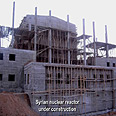
IAEA: Syria site was 'very likely' an atom reactor
Confidential report by UN nuclear watchdog says Deir ez Zor site bombed by Israel in 2007 a covert nuclear plant designed to produce plutonium
A Syrian site bombed by Israel in 2007 was "very likely" to have been a nuclear reactor, the UN atomic agency said in a report, a conclusion which may lead to Damascus being referred to the UN Security Council.
The confidential report by the International Atomic Energy Agency (IAEA) threw independent weight behind US allegations that Syria was secretly building a reactor at the Deir ez Zor site in the desert, possibly with military aims.
It was obtained by Reuters on Tuesday, a day after the European Union imposed sanctions on Syrian President Bashar Assad and other senior officials, raising pressure on his government to end weeks of violence against protesters.
Syrian activists say more than 1,000 civilians have been killed in a crackdown on demonstrators opposing Assad's rule.
The West has become increasingly frustrated over what is seen as Syria's stonewalling of an IAEA probe into Deir ez Zor, which US intelligence reports said was a nascent North Korean-designed reactor intended to make bomb fuel.
Syria, an ally of Iran, denies harboring an atom bomb program and says the IAEA should focus on Israel instead because of its undeclared nuclear arsenal.
"Based on all the information available to the agency and its technical evaluation of that information, the agency assesses that it was very likely that the building destroyed at Deir ez Zor site was a nuclear reactor which should have been declared to the agency," the IAEA's report said.
The Vienna-based UN body had previously said there were indications nuclear activity may have taken place at the site.
The United States and its European allies are expected to seize on the report's finding to push for a decision by the IAEA's 35-nation board, meeting on June 6-10, to report the Syrian nuclear issue to the UN Security Council.
Syria under pressure
"The report provides the IAEA's conclusion that Syria was constructing a covert nuclear reactor, and we believe that reactor was designed to produce plutonium for possible use in nuclear weapons," a Western diplomat said.
Another diplomat in Vienna said: "I presume that they (the United States and its allies) will press ahead now. They got the report they asked for, they got as strong a wording as the agency, I think, can come up with."
But some non-Western envoys have expressed skepticism about any such step by the IAEA board, saying that whatever Syria did at Deir ez Zor it was now in the past.
The IAEA board has the power to refer countries to the Security Council if they are judged to have violated IAEA rules - designed to make sure atom technology is not diverted for military aims - by carrying out covert nuclear work.
It reported Iran to the Security Council in 2006 over its failure to dispel suspicions that it was trying to develop nuclear weapons. Tehran has since been hit with four rounds of UN sanctions over its refusal to curb sensitive nuclear work.
Saying Deir ez Zor was a military, non-nuclear site, Syria has for nearly three years refused to allow UN inspectors to revisit the site destroyed by Israel.
Western diplomats say Syria's refusal to allow UN inspectors follow-up access to Deir ez Zor risks undermining the IAEA and the nuclear Non-Proliferation Treaty that underpins its work to prevent the spread of atom bombs, if nothing is done.
Preparations for a possible US-led move by the IAEA's board coincide with a Syrian crackdown on pro-democracy demonstrations, but Western diplomats say the two issues are separate.
- Follow Ynetnews on Facebook










